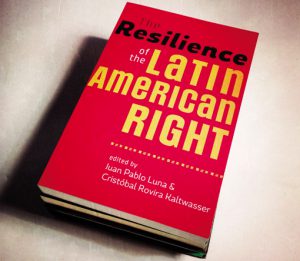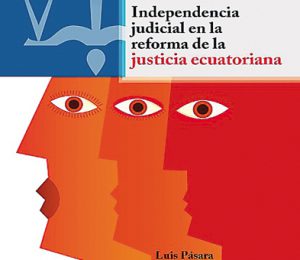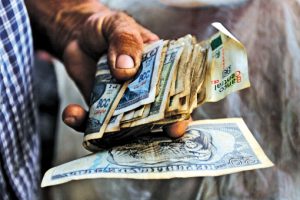
Argentina’s Debt: A Conflict of Principles
The reverberations of Argentina’s loss in NML Capital Ltd. vs. Republic of Argentina continue. The conflict stems from a 2012 decision by United States District Court for the Southern District of New York (SDNY) Judge Thomas Griesa in a case brought by the hedge fund NML Capital Ltd. and others (NML), over $1.3 billion of … Read more
Monday Memo: Haitian Immigrants – Venezuelan Currency Losses – Abortion in Chile – Iguala Relatives in Geneva – Puerto Rico’s Economy
Likely top stories this week: the deadline passes for children of undocumented immigrants to apply for legal status in the Dominican Republic; U.S. companies stand to lose billions of dollars in Venezuelan currency losses; Michelle Bachelet moves to end Chile’s abortion ban; relatives of Mexico’s 43 missing students meet with UN officials in Geneva; Puerto … Read more
Monday Memo: Venezuela Protests – Haiti Elections – Caribbean Energy – AT&T – Brazil Olympics
This week’s likely top stories: Venezuelan opposition leaders halt protests in Caracas; Haiti swears in its nine-member Provisional Electoral Council; the U.S. hosts the first-ever Caribbean Energy Security Summit; AT&T acquires Nextel Mexico; Rio’s environment secretary announces that Guanabara Bay will not be clean in time for the 2016 Olympic Games. Opposition Curbs Protests in … Read more
Maduro Addresses Venezuelans about Faltering Economy
Venezuelan President Nicolás Maduro made his annual address to the legislature on Wednesday, defending his government’s socialist economic model and accusing the Venezuelan political opposition of waging an “economic war” that has led to the country’s current financial crisis. That crisis has worsened in recent weeks as global oil prices have plummeted and the price … Read more
Monday Memo: Panama Canal – Venezuela Diplomacy – 114th U.S. Congress – Guatemala Trial – Uruguay Elections
This week’s likely top stories: the Panama Canal gears up to expand its Pacific coast facilities; Venezuelan President Nicolás Maduro travels to China and OPEC countries; the 114th U.S. Congress starts its session on Tuesday with a Republican majority and plenty of hot button issues for the Americas; the trial of Guatemalan General Efraín Ríos … Read more
Un barril de problemas para Venezuela
Ernesto Villegas, director de propaganda del Partido Socialista Unido de Venezuela (PSUV), aseguró hace dos semanas que si el petróleo venezolano llegase a cotizarse a 7 dólares por barril, la “revolución bolivariana no caería, se fortalecería”. La afirmación parece aventurada, incluso para los dirigentes del chavismo, acostumbrados a permear la realidad nacional con desconexos jingles … Read more
Monday Memo: Brazil Petrobras — Haiti Protests — LatAm Currencies — Guantánamo Prisoners —Mexico Missing Students
This week’s likely top stories: Brazilian prosecutor plans to indict at least 11 in the Petrobras scandal; Haitian protestors in Port-au-Prince demand long-overdue elections; Latin American currencies drop as U.S. job growth surges in November; U.S. releases six Guantánamo prisoners to Uruguay; Meixcan government identifies the remains of one of 43 missing students. Brazilian Prosecutor … Read more
Monday Memo: Peru COP20 — Uruguay Election — Colombia Peace Talks — Venezuela Oil — Cuba GDP
This week’s likely top stories: Global leaders gather in Lima for the COP20 Climate Summit; Tabaré Vázquez wins the runoff presidential election in Uruguay; With FARC hostages released, Colombian peace talks are set to resume in Havana; Venezuela braces for impact as oil prices hit rock bottom; Cuba misses the mark on economic growth in … Read more

The Resilience of the Latin American Right
Unlike the internationalist left over the past century, the Latin American right has never been united by a single symbol or slogan. This was not accidental. In a region that only recently abandoned military dictatorship, why would political parties openly identify with repressive authoritarian regimes? And with 165 million people still living in poverty, hoisting … Read more

From the Think Tanks
In “Independencia judicial en la reforma de la justicia ecuatoriana,” the Due Process of Law Foundation argues that the Ecuadorian judiciary’s independence vis-à-vis other branches of government has been compromised. Based on a review of high-profile court cases, Consejo de la Judicatura (Judicial Council) resolutions, official statements, and more than 20 interviews with government workers, … Read more
![165787185C[Converted] copy](https://americasquarterly.org/wp-content/uploads/2014/10/165787185CConverted-copy-300x200.jpg)
Can Cuba’s Economic Reforms Succeed?
The impression most casual observers receive today from Cuba is that since Raúl Castro assumed power in 2006, the country has been going through a dramatic transition to a market economy. But while what the younger Castro brother has called “structural reforms” are important steps toward a market under Cuba’s revolutionary government, they are a … Read more

Double Trouble: Currency Unification in Cuba
After nearly 20 years, the dual currency system enacted by Cuba to help mitigate the economic shock from the collapse of the Soviet Union is set to be retired. As part of the government’s efforts to develop the country’s socialist economy, the Cuban government recently announced that it would unify its complicated currency system. In … Read more
Monday Memo: Ecuador Amendments — P&G Tax Fraud — Brazil Solar Parks — U.S. Midterm Elections – Colombia Paramilitary Sentenced
This week’s likely top stories: Ecuador’s National Assembly dismisses referendum on controversial constitutional amendments; Argentina suspends Proctor & Gamble for fiscal fraud; Brazil grants contracts for 31 new solar parks; U.S. gears up for midterm elections and immigration reform; Colombian court sentences AUC paramilitary leader to 8 years. Ecuador’s National Assembly Strikes Down Referendum on … Read more
Monday Memo: Brazil Elections – Uruguay Elections – Citgo Petroleum – Protests in Haiti – Chiquita
This week’s likely top stories: Brazil’s President Dilma Rousseff is re-elected; Uruguayan elections move to a second round; Venezuela scraps the sale of Citgo Petroleum; Haitians protest a lack of elections; a Brazilian consortium acquires Chiquita. Dilma Rousseff Re-elected President of Brazil: Brazilian President Dilma Rousseff was narrowly re-elected on Sunday in a runoff election … Read more

Fresh Look Reviews
Fresh, unique perspectives on recent books from across the hemisphere originally published in English, Spanish and Portuguese.


